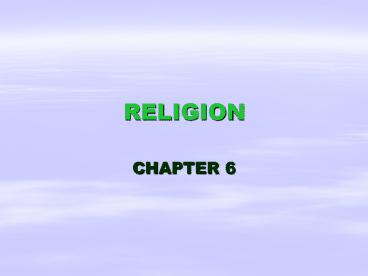RELIGION - PowerPoint PPT Presentation
1 / 18
Title:
RELIGION
Description:
TYPES OF RELIGIONS UNIVERSALIZING ETHNIC RELIGIONS Organization of Universalizing Religion Distribution Religion and the Cultural Landscape Effect on ... – PowerPoint PPT presentation
Number of Views:173
Avg rating:3.0/5.0
Title: RELIGION
1
RELIGION
- CHAPTER 6
2
Religion is fundamental to culture.
- Constantly changing
- Diffuses across cultural barriers and language
boundaries - Despite the urbanization and secularization of
modern societies, religion still dominates the
lives and behaviors of billions of people.
3
What is religion?
- Manifests itself in many different ways (ancestor
worship, animism, deities, living people with
supernatural powers) - Key characteristics
- Set of doctrines and beliefs relating to a god or
gods - Rituals expressing these beliefs
- Expressed at routine intervals (holy days)
- Prayer is a common ritual
- Many have vast, complex organizational structures
4
Organized religion has had powerful effects on
society
- Combating social ills
- Sustaining the poor
- Promoting the arts
- Educating the deprived
- Advancing medical knowledge
5
Organized religion has also
- Blocked scientific study
- Encouraged the oppression of dissidents
- Supported colonialism and exploitation
- Condemned women to an inferior status in many
societies
6
TYPES OF RELIGIONS
- MONOTHEISTIC
- POLYTHEISTIC
- ANIMISTIC
7
UNIVERSALIZING
- Also called Global or Proselytic
- Attempt to be global and to appeal to all people
- 60 of worlds population
- Christianity, Islam, Buddhism, Sikhism (meditate
on the word and character of God), and Bahai
(acceptance of most World Religions)
8
ETHNIC RELIGIONS
- Also called Cultural tribal/traditional
religions are a kind of ethnic - Appeal primarily to one group of people living in
one place - 25 of worlds population
9
Organization of Universalizing Religion
- Branches
- Roman Catholic, Protestant, Eastern Orth.
- Sunni83, Shia16
- Denominations (Divisions within the branches)
- Sects (formed to protest the Mother Religion)
10
Distribution
- See maps/transparencies
11
Religion and the Cultural Landscape
- Boundaries often rigid and unstable
- Religious structuresworship and sacred space
- Landscapes of the deaddisposal
- Influence on agriculture and domesticated animals
- Toponyms name of a location
12
Effect on environment
- Ecotheologybody of literature that studies the
role of religion in habitat modification (ie. In
some faiths, human power over natural forces is
assumed - Teleologydoctrine that the Earth was created
especially for human beings (Judeo-Christian
religious heritage)
13
Religion and Conflict
- Religion versus Government
- Religion versus Religion
- Interfaith
- Intrafaith
- Fundamentalism
14
Christianity 2 billion Islam 1.3
billion Hinduism 900 million Secular/Nonreligio
us/Agnostic/Atheist 850 million Buddhism 360
million Chinese traditional religion 225
million
15
primal-indigenous 150 million African
Traditional Diasporic 95 million Sikhism 23
million Juche 19 million Spiritism 14
million Judaism 14 million
16
Baha'i 6 million Jainism 4 million Shinto 4
million Cao Dai 3 million Tenrikyo 2.4
million Neo-Paganism 1 million
17
Unitarian-Universalism 800 thousand Rastafariani
sm 700 thousand Scientology 600
thousand Zoroastrianism 150 thousand
18
Major Religions of the WorldRanked by Number of
Adherents































